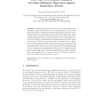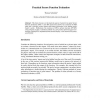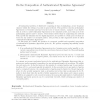469 search results - page 33 / 94 » On Adversary Models and Compositional Security |
EUROCRYPT
2007
Springer
14 years 1 months ago
2007
Springer
Abstract. Multiparty signature protocols need protection against roguekey attacks, made possible whenever an adversary can choose its public key(s) arbitrarily. For many schemes, p...
FOSSACS
2009
Springer
14 years 2 months ago
2009
Springer
Although cryptographic protocols are typically analyzed in isolation, they are used in combinations. If a protocol was analyzed alone and shown to meet some security goals, will it...
INFORMATIKTAGE
2008
13 years 9 months ago
2008
: This thesis focuses on the practical aspects of general two-party Secure Function Evaluation (SFE). A new SFE protocol that allows free evaluation of XOR gates and is provably se...
PKC
1999
Springer
13 years 12 months ago
1999
Springer
This paper presents a simple and efficient conversion from a semantically secure public-key encryption scheme against passive adversaries to a non-malleable (or semantically secure...
STOC
2002
ACM
14 years 8 months ago
2002
ACM
A fundamental problem of distributed computing is that of simulating a secure broadcast channel, within the setting of a point-to-point network. This problem is known as Byzantine...



